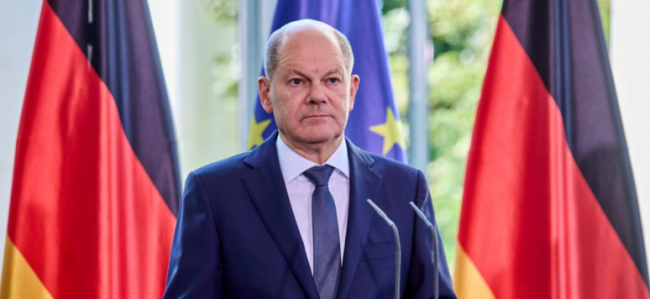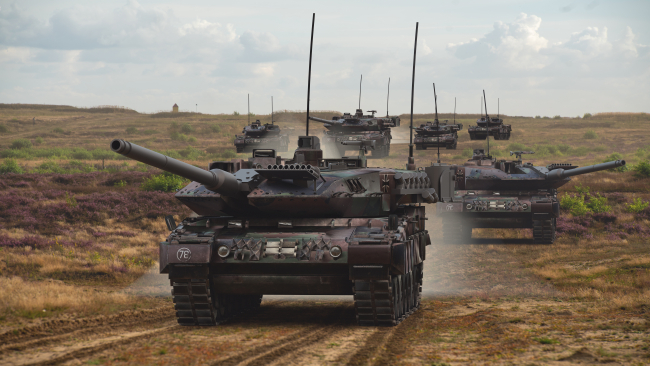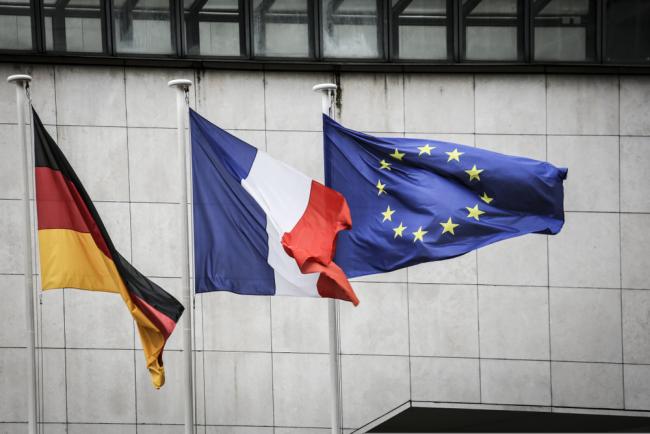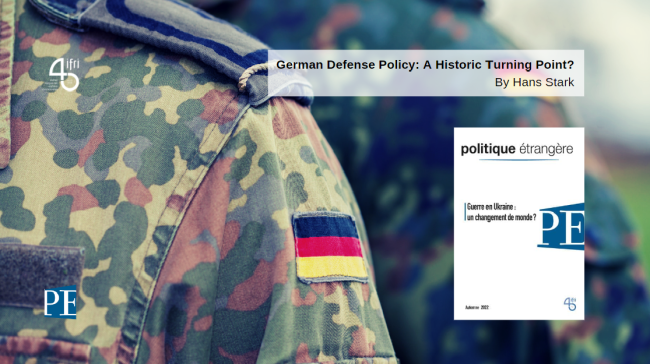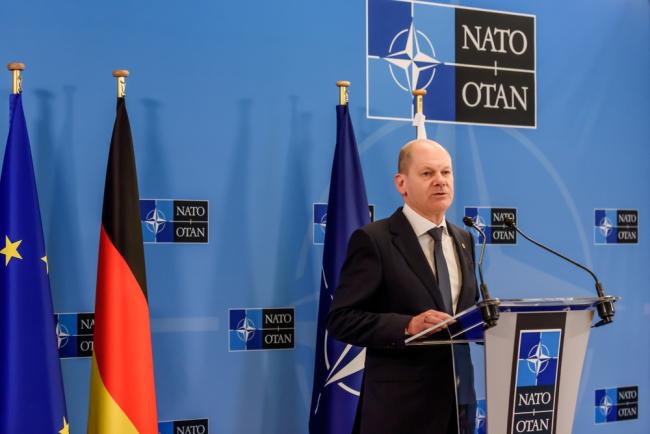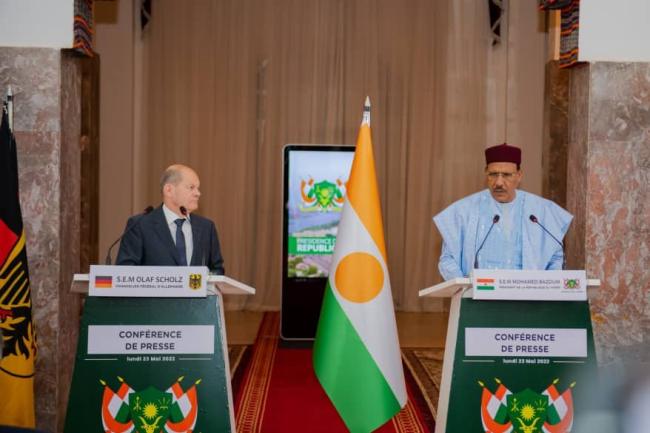Germany
An in-depth analysis of Germany's trajectory through its foreign and European policies, its relations with France, its economy and its domestic politics, offering a perspective on the country and its role in the world.
Related Subjects

The Cumbersome Legacy of the SPD’s Policy Towards Vladimir Putin’s Russia
The Social Democratic Party of Germany (SPD) looks back with pride on the history of its Ostpolitik, which it sees as having paved the way for German reunification. With the firm will to continue this Ostpolitik after the end of the Cold War, SPD politicians of the last 20 years have, within the framework of their government responsibility, focused on a partnership with Russia, which had the goal of contributing to the democratization of Russia through bilateral trade and mutual interdependence.
Attention to the Periphery? Germany and the Pacific Island States
In September 2020, Germany adopted policy guidelines for the Indo-Pacific that comprehensively set out its approach towards this increasingly important region, seeking to diversify partnerships beyond China.
The German Government's Support Plan for Households and Businesses: How to Compensate for the Double Energy and Economic Shock?
In response to Russia's illegal attack on Ukraine, EU member states have issued a series of economic sanctions against Russia. This also includes moratoria on certain products, e.g., in the energy sector.
Modernization of the Bundeswehr: Back to basics?
Against the backdrop of the war in Ukraine, the Bundeswehr has been led to refocus on territorial defense and collective security, which constituted the core of its activity for decades. This evolution break with the long period of efforts during which the Bundeswehr painfully tried to transform itself into an intervention army.
More Europe in the face of realpolitik’s return? French perspectives on 30 years of German reunification
The current geopolitical situation has disrupted the European and global order, which were both consolidated in the 1990s and have been key factors in the modern German model. The Franco-German duo is currently facing new challenges and it will have to respond appropriately in a time when the EU’s global influence is shrinking in the face of what some analysts call a “new Cold War”.
German Defense Policy: A Historic Turning Point?
The war in Ukraine has been a rude awakening for Berlin.
Germany, the “Zeitenwende” and the Future of NATO
After Mali, what Commitment from Germany in the Sahel?
Germany, despite the reluctance of its public opinion, is committed to supporting security in the Sahel, notably through its participation in the European Union Training Mission in Mali (EUTM) and recently in Niger, and in the United Nations Multidimensional Integrated Stabilization Mission in Mali (MINUSMA).

Dependence in Europe's Relations with China: Weighing Perceptions and Reality
The idea that Europe has grown dependent on China is now a common refrain, but just how is this notion understood in capitals across the continent?
The French Strategy of the Saarland. A German Federal State on the Way to a Living European Multilingualism
With the France Strategy, Saarland set out in 2014 to become an efficient multilingual German-French region within a generation.
Youth Unemployment in Europe
On an initiative of the IP-Journal of the German Council of Foreign Relations (DGAP), the Study Committee for Franco-German Relations (Cerfa) of the French Institute of International Relations (IFRI) and the Polish Institute of International Affairs (PISM) are regularly publishing short contributions on a common subject, written by three experts of these institutes. The purpose of these “Weimar Triangle Analyses” is to give the French, Polish and German views on central questions of European politics and European integration.
States' Power in the European Union
On an initiative of the IP-Journal of the German Council of Foreign Relations (DGAP), the Study Committee for Franco-German Relations (Cerfa) of the French Institute of International Relations (IFRI) and the Polish Institute of International Affairs (PISM) are regularly publishing short contributions on a common subject, written by three experts of these institutes. The purpose of these “Weimar Triangle Analyses” is to give the French, Polish and German views on central questions of European politics and European integration.
The intervention in Mali: Weimar Triangle Analyses: French, Polish and German viewpoints on European questions
On an initiative of the German Council of Foreign Relations (DGAP), the Study Committee for Franco-German Relations (Cerfa) of the French Institute of International Relations (IFRI) and the Polish Institute of International Affairs (PISM) are regularly publishing short contributions on a common subject, written by three experts of these institutes. The purpose of these “Weimar Triangle Analyses” is to give the French, Polish and German views on central questions of European politics and European integration.
A Transatlantic Free Trade Agreement? Weimar Triangle Analyses: French, Polish and German viewpoints on European questions
On an initiative of the German Council of Foreign Relations (DGAP), the Study Committee for Franco-German Relations (Cerfa) of the French Institute of International Relations (IFRI) and the Polish Institute of International Affairs (PISM) are regularly publishing short contributions on a common subject, written by three experts of these institutes. The purpose of these “Weimar Triangle Analyses” is to give the French, Polish, and German views on central questions of European politics and European integration.
Britain's potential exit from the EU – Weimar Triangle Analyses: French, Polish and German viewpoints on European questions
On an initiative of the German Council of Foreign Relations (DGAP), the Study Committee for Franco-German Relations (Cerfa) of the French Institute of International Relations (IFRI) and the Polish Institute of International Affairs (PISM) are regularly publishing short contributions on a common subject, written by three experts of these institutes. The purpose of these “Weimar Triangle Analyses” is to give the French, Polish and German views on central questions of European politics and European integration.
France, Germany and European defence: more pragmatism and less pathos, please
At the time of the 50th anniversary celebrations of the Elysée treaty in January 2013, the Franco-German defence cooperation is not at its best.

France and the Deepening of the Eurozone: Is There a Way for Franco-German Convergence?
German-Russian Relations: Balance Sheet since 2000 and Perspectives until 2025
The relationship between Germany and Russia, according to official portrayals in Berlin, is one of ‘strategic partnership’ supplemented by ‘modernisation partnership’. The closeness and at times demonstrative cordiality of the relations have given rise to suspicion about Germany being an advocate of Russian interests in Europe for the benefit of its economy but at the expense of Europe’s trans-Atlantic links.

France's Partner on a Pedestal: A View Driven by Pragmatism and Envy
This paper brings together contributions from a cross-section of EU member states and the Gallup World Poll survey on the question of how Germany is being viewed at this time of economic and political crisis.

The Rotating Presidency under the Lisbon Treaty: From Political Leader to Middle Manager?
Support independent French research
Ifri, a foundation recognized as being of public utility, relies largely on private donors – companies and individuals – to guarantee its sustainability and intellectual independence. Through their funding, donors help maintain the Institute's position among the world's leading think tanks. By benefiting from an internationally recognized network and expertise, donors refine their understanding of geopolitical risk and its consequences on global politics and the economy. In 2025, Ifri supports more than 80 French and foreign companies and organizations.









